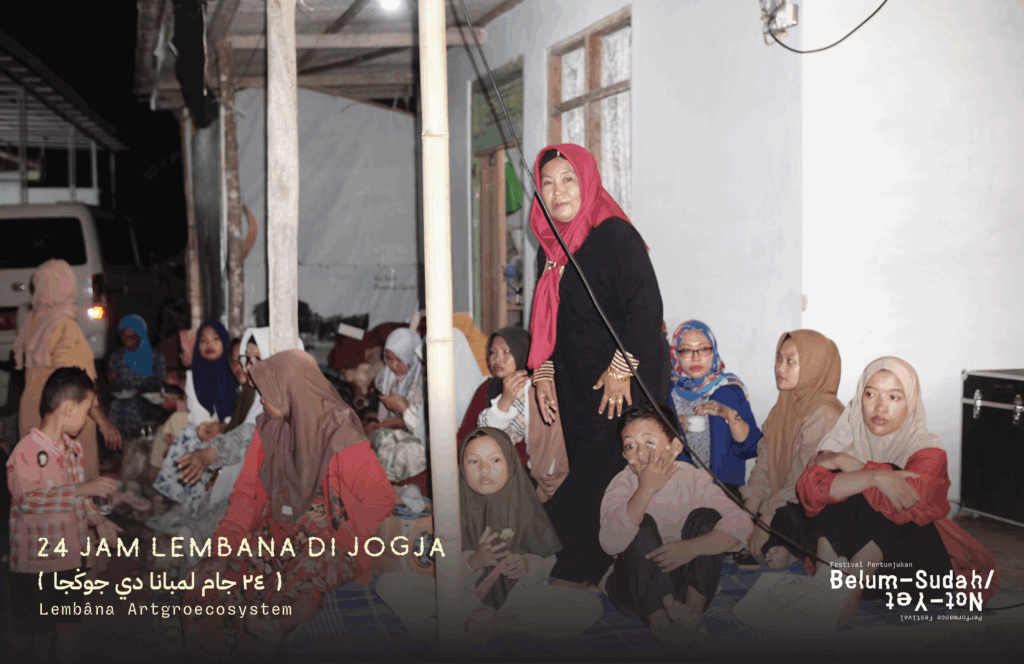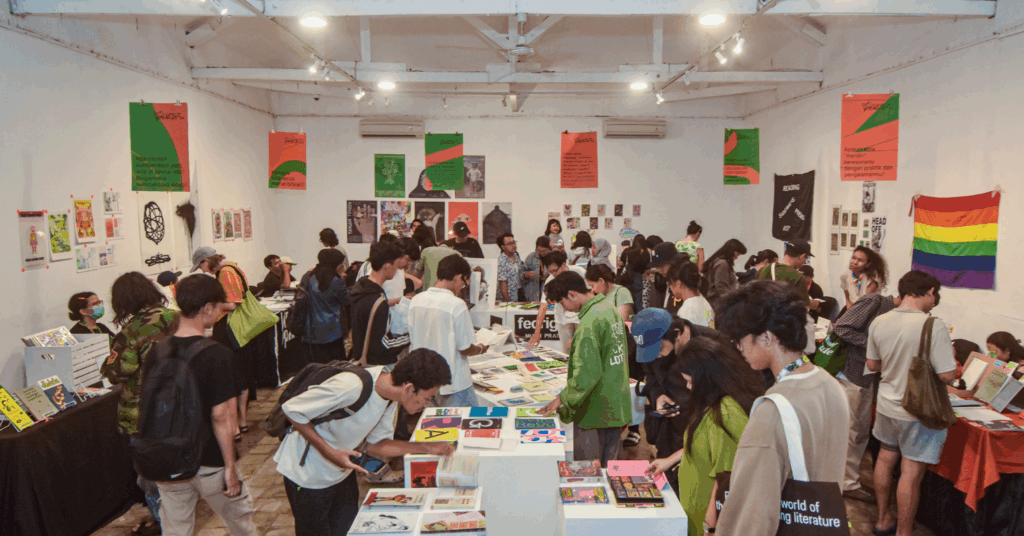The Not-Yet Performance Festival Showcases Indonesia’s Diverse Cultural Backdrop

The Not-Yet Performance Festival (Festival Pertunjukan Belum-Sudah / FPB-S/N-YPF) will take place from July 25, 2025 to July 31, 2025, across various venues in Yogyakarta, Indonesia. Organized by the Garasi Performance Institute (GPI), the festival serves as both a culmination and continuation of GPI’s long-standing commitment to nurturing performance practices grounded in both Indonesia’s socio-cultural context and broader conversations in the Global South.
With the theme “Gelagat Liar” (Wild Gestures), this year’s edition explores decolonial gestures in performance — gestures that resist, reinterpret, and reconfigure dominant narratives surrounding history, space, and the body. These wild gestures are not chaotic acts of rebellion, but rather careful, embodied responses to systems that have tried to confine and silence. They arise from the need to imagine otherwise. Join EnVi as we dive deeper into the Not-Yet Performance Festival!

A Living Manifesto of Artistic Possibilities
The history of Garasi Performance Institute (GPI)’s relationship with artists and collectives from Indonesian cities like Sumenep, Makassar, and Maumere is rooted in the belief that art-making is a form of collective learning: learning from diverse ways of living, thinking, and practicing. This effort emerges from the need to reread Indonesia’s socio-cultural landscape through intersecting peripheries that are equally valid. Since 2017, and through programs such as “Performing Difference,” “Cabaret Chairil,” and “Open Lab,” GPI has become a transitional learning space that weaves these encounters together through workshops, laboratories, residencies, and cross-disciplinary practices.

This aligns with GPI’s post-territorial strategy: moving beyond the idea of one community, one studio, or one city toward a flexible network of cultural sites. The historical and cultural differences between these cities enrich this network. These differences are not meant to be dissolved but instead preserved as alternative pathways for reimagining Indonesian-ness and Asian-ness. This is what makes GPI not a center of distribution, but an arena: a place where sprawling networks of knowledge can grow from any direction, rooted in local histories, grounded in the specificities of resource realities — all while remaining open to new ways of living together.
Garasi Performance Institute’s Co-Artistic Director, Eka Putra Nggalu, stated: “Belum-Sudah (Not-Yet) is a declaration of commitment to exploring the entangled strands of border thinking and doing — critical, dialectical, and reparative in our present time.”
The Roots of Not-Yet
Referring to Ernst Bloch, Not-Yet (Belum-Sudah) is not a utopia in the form of a fixed ideal world, but a dynamic process of becoming that is grounded in the latent possibilities of the present. It is an open-ended world within a dialectical horizon, rooted in past experiences and open to future possibilities. For José Esteban Muñoz, such a utopia must embrace the wounds of history, as well as future visions that are dynamic, diverse, and proliferating from multiple directions.

“We offer Belum-Sudah as a way of seeing the world (including performance and art) that is more open, fair, and equitable — especially in the face of today’s world, which remains imbalanced in many dimensions. This kind of utopia is not yet imaginable in its form or surface. It must summon, scavenge, and nurture today’s urgent realities together. It recognizes and inhabits today’s events as potentials and as wonders that call forth a future. It sees these potentials as signposts, as trailblazers through dense terrain — diverse and proliferating,” the festival’s curators, Mega Nur and Taufik Darwis, explained.
“Belum-Sudah” is a declaration of commitment to engaging in the many branching thoughts and border-practices — critical, dialectical, and reparative — for the present.
“We understand “belum” (not-yet) and “sudah” (already) not as two opposing poles, but as two movements that infiltrate and influence one another. In this sense, performance work becomes a field of the deferred, the fractured, and the perhaps never finished. But it is precisely there that its potential lies: as a space to reimagine, to reorganize, and to collectively experience,” the curators stated.
On The Topic Of Decolonial Gestures
Several specific decolonial gestures highlighted in this festival emerge from how the artists reinterpret, intervene in, and hack dominant narratives of history, space, and the body. For instance, “Wicara Kepahitan” by Taman Kata-Kata rejects the normative logic of reconciliation, instead framing the acknowledgment of pain as a shared infrastructure that doesn’t need to be “resolved.” Studio Malya and their collaborators guide audiences to infiltrate Fort Vredeburg — a colonial site now turned into a national monument — to steal back fragments of memory dominated by official narratives. Aliansyah Caniago opens up a communal space through the practice of hand massage and camphor oil, reconnecting Batak (Sumatran native ethnic) diaspora bodies to lost archives and planting relationality, while simultaneously “mocking” colonial logics that once turned Barus into celluloid. Isvhara Devati’s work embraces the figure of “Mak Lampir” — a mythical figure forever returning from the dead — as a queer-camp tactic to carve a transformative path out of the rigid categories of body and gender deemed illegal.

See You There!
The FPB-S/N-YPF marks an important milestone in GPI’s journey. More than just an event, this festival is a forum and meeting space where diverse ideas, bodies, and social contexts intersect and are tested collectively. The festival presents nine performances by artists and collectives from various backgrounds, including Aliansyah Caniago (Banda Aceh), Ishvara Devati and Josh Marcy (Jakarta), Lembana Artgoecosystem (Madura), Rachmat Mustamin & Studio Patodongi (Makassar), Puri Senja (Surabaya), Enji Sekar, Putu Alit Panca & Taman Kata-kata, as well as Studio Malya, Reza Kutjh, and Rifki Akbar Pratama (Yogyakarta).
The festival also includes 10 symposiums designed as an extension of artistic work. The symposiums open up alternative worlds offered by performance through two approaches: “thinking with performance” and “reparative reading.”
In line with this, FPB-S/N-YPF curatorial team, Mega Nur and Taufik Darwis, shared: “This festival is more about building a situation to process and grow together; to keep searching for potential and possibilities, which may not be finished, but are felt and valuable.”
GPI invites the public to witness and feel firsthand how performance becomes a living social field that intersects with location, history, and perspectives. The Not-Yet Performance Festival runs from July 25, 2025 until July 31, 2025. If you happen to be in Yogyakarta, do try to pay a visit!
Travelling to Yogyakarta soon? Visit the annual art exhibition ARTJOG 2025! Check out EnVi’s review about the exhibition here.



